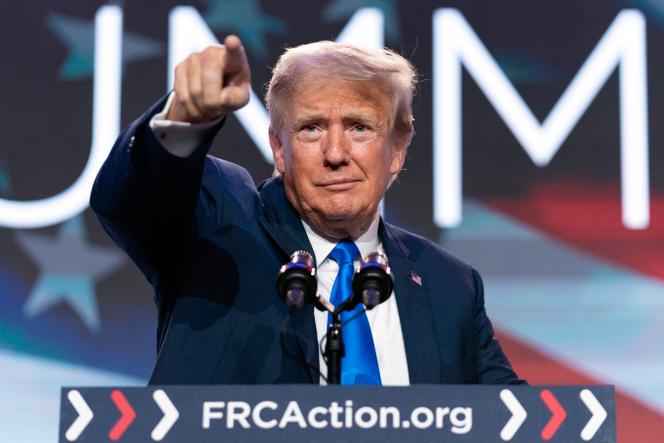


It was a balmy evening for Donald Trump. Washington may well represent the heart of the fantasized "deep state" supposedly out to get him, but the former US president had made the trip to the capital on Friday, September 15 to attend the annual summit of an influential evangelical organization, the Family Research Council. A much-coveted constituency on the right in the run-up to the primaries, it gave him a triumphant welcome. With just one reservation: an awkward silence during one passage of his speech, devoted to abortion.
The passage was interminable and improvised, often nebulous and contradictory. But its general tone challenged the most repressive approach to the voluntary termination of pregnancy (VTP) by elected officials and the fervent religious base of the Republican Party. Since the Supreme Court took away the constitutional right to abortion from American women in June 2022, leaving the issue to each state, it has become the most powerful mobilizing factor among Democrats. At every referendum, voters have rejected extremist measures, including in conservative states like Kansas and Kentucky.
In the November 2022 midterm elections, the Republicans' disappointing result, despite a narrow majority in the House of Representatives, was due in part to the high turnout of young people and women, worried about the ongoing reactionary offensive. Since then, the Democrats have continued to perform very well locally.
"Like President Ronald Reagan before me, I support the three exceptions: for rape, incest and the life of the mother," said Trump, following in a traditional line. Welcoming the end of Roe v. Wade (1973), thanks to the three conservative justices he had promoted to the Supreme Court, the former president also considered the issue to be "very delicate." "Many politicians who are pro-life do not know how to properly discuss a topic which is so important to the people in this room and so important to millions and millions of people in our country," Trump added, continuing "and if they don't speak about it correctly, they're not going to win."
Does he support the idea of a federal law, setting a maximum delay of 12 or 15 weeks for abortion? Trump deliberately maintained confusion on this point. "But now," he said, addressing the suddenly tense audience, "you have this tremendous power to negotiate something, and something will be negotiated, because we have to bring our country together on this issue." It's hard to advocate compromise in front of activists for whom abortion is an absolute ideological battle.
You have 56.45% of this article left to read. The rest is for subscribers only.
